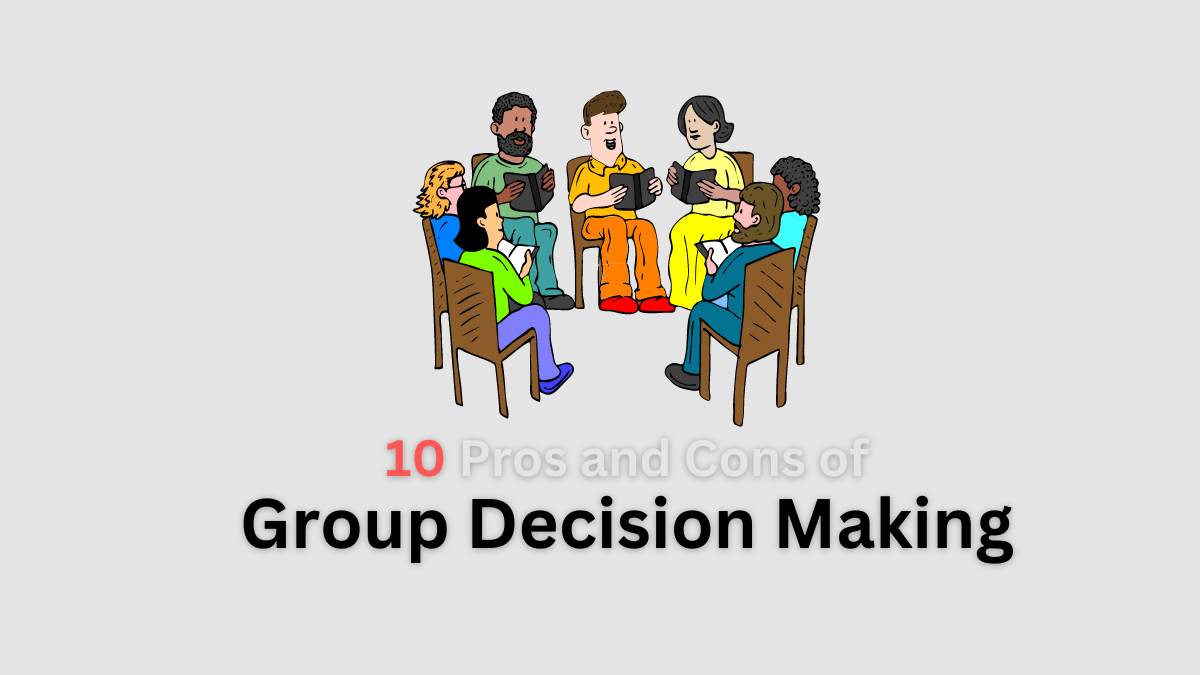Pros and Cons of Group Decision Making
Group decision-making involves the interaction of multiple members who deliberate on an issue and conclude collectively. Managers at different levels may sit together, discuss problems, consider information and alternatives, and assume collective responsibility for the decision.
In this article, we will discuss 10 major pros and cons of group decision making in the workplace, so let’s get started:
Main Pros of Group Decision Making
Following are the five main benefits of group decision-making:
Diversity in Opinions
Groups consist of individuals from various backgrounds, bringing a wide range of perspectives to the table. This diversity leads to innovative solutions and comprehensive strategies that might not emerge from individual decision-making.
Diverse opinions help in identifying potential risks and opportunities, making the decision more robust and well-rounded.
Enhanced Participation and Interest
When individuals are actively involved in the decision-making process, they are more likely to be committed and invested in the outcomes.
This engagement fosters a sense of ownership and accountability among group members, encouraging them to contribute their best ideas and efforts. Increased participation also leads to more thorough discussions and well-considered decisions.
Collective Contribution of Ideas
Group discussions leverage the collective intelligence of all members, reducing the likelihood of biased or one-sided decisions.
By pooling their knowledge and experiences, groups can generate a wider array of alternatives and solutions. This collective brainstorming helps in identifying the most viable options, enhancing the quality and reliability of the final decision.
Democratic Decision Making
Group decision-making processes are inherently democratic, promoting fairness and inclusivity.
Decisions made collectively are more likely to be accepted and supported by all members, as they feel their voices have been heard. This democratic approach ensures that the decision reflects the consensus of the group, making it more implementable and sustainable in the long run.
Read More: 10 Major Pros and Cons of Business Ethics
Team Building and Skill Development
Participating in group decision-making processes helps in building stronger teams and improving interpersonal relationships among members.
It fosters collaboration, communication, and mutual respect, which are crucial for effective teamwork. Additionally, individuals develop critical decision-making skills, enhancing their ability to contribute to future group tasks and projects.
Main Cons of Group Decision Making
Group decision-making also has some drawbacks, here are five to mention:
Time Consumption
Group decision-making often takes significantly more time than individual decision-making. The need to discuss and evaluate multiple perspectives and reach a consensus can be a lengthy process.
This time consumption can be a disadvantage, especially in situations where quick decisions are crucial. Delays in decision-making can hinder timely implementation and responsiveness to urgent issues.
Read More: 10 Major Pros and Cons of Outsourcing
Conflicts and Disparities
The presence of diverse opinions and interests in a group can lead to conflicts and disagreements. While some level of debate can be healthy, excessive conflicts can disrupt the decision-making process and create a hostile environment.
Personal biases and power dynamics within the group can also lead to decisions that do not necessarily reflect the best interests of the organization or all its members.
Social Pressures and Conformity
Social pressures within a group can influence individual behavior and opinions. Some members might conform to the majority view to avoid conflict or rejection, even if they do not fully agree with it.
This phenomenon, known as groupthink, can lead to suboptimal decisions as critical viewpoints are suppressed. The desire for harmony and consensus can overshadow the need for critical evaluation and dissenting opinions.
Read More: 10 Major Pros and Cons of Planning
Risk of Dominance by Certain Members
In some groups, dominant individuals may exert undue influence over the decision-making process, overshadowing quieter or less assertive members.
This dominance can skew the decision-making process and lead to biased outcomes. The overuse of authority by certain members can stifle creativity and discourage others from actively participating, reducing the overall effectiveness of the group.
High Costs
Group decision-making can be resource-intensive in terms of time, money, and energy. Coordinating schedules, facilitating discussions, and managing the logistics of group meetings can be costly, especially for larger groups.
Additionally, the effort required to reach a consensus and implement the decision can strain organizational resources. The benefits of group decision-making must be weighed against these costs to ensure it is a feasible approach.
Hence, the above-mentioned are the 10 major pros and cons of group decision-making.
Read Next: 10 Major Pros and Cons of SWOT Analysis
